IMPROVING THE QUALITY OF LINKED DATA USING STRING SUGGESTIONS
IMPROVING THE QUALITY OF LINKED DATA USING STRING SUGGESTIONS
Author(s): Ilie Cristian DOROBĂȚ, Octavian RINCIOG, George Cristian MURARU, Vlad POSEASubject(s): Present Times (2010 - today), ICT Information and Communications Technologies
Published by: Carol I National Defence University Publishing House
Keywords: Open Data; Karma; Error Correction; String Matching;
Summary/Abstract: The Semantic Web standardization and their growing usage in professional communities, both governmental and non-governmental, have naturally driven for accelerating the growth of published data volume in the virtual space by 422 published datasets in 2011 to 9,960 until 2019, totaling of 149,423,660,620 triples from various areas as medicine, education, art, history, technology, public administration etc. This trend of increasing of the semantic datasets published in the virtual space, leads to the emergence of a new challenge: ensuring the data quality; a first step in this direction being made by Tim Berners-Lee in 2010, when he defined a set of criteria that data scientists are encouraged to use it for ensuring a highest quality level of datasets. However, an important shape has not been mentioned: data accuracy, a feature not strictly specific to semantic data but which is applied to any type of data representation. The paper starts with a brief presentation of the most important metrics used to determine the level of data quality, along with a brief introduction of the most used string similarity algorithms. After that, the paper presents a new feature for an existing open data integration tool, called Karma, that allows users, such as data analysts and scientists, to improve their time management plan by reducing the time needed to clean their data. This feature has been implemented as a string suggestion for miswritten strings by using the presented string similarity metrics, keeping, at the same time, the framework design and the framework workflow too.
Journal: Conference proceedings of »eLearning and Software for Education« (eLSE)
- Issue Year: 16/2020
- Issue No: 02
- Page Range: 375-381
- Page Count: 7
- Language: English

